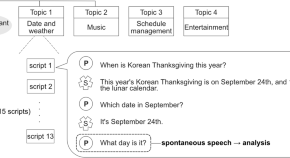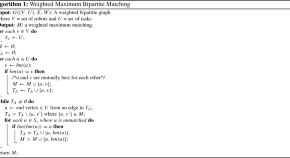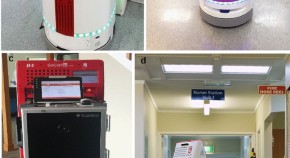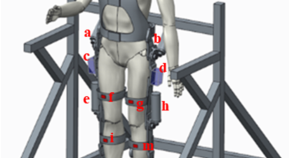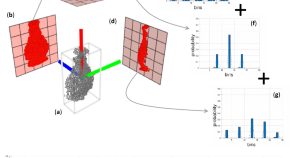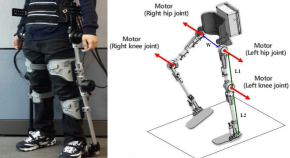Toward a conversational model for counsel robots: how different question types elicit different linguistic behaviors
Authors (first, second and last of 5)
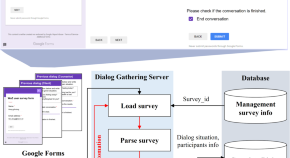
Collection
The purpose of this special issue is to explore how social robots can interact with humans socially and facilitate the integration of service robots. This special issue focuses on three social aspects of human-robot interaction: (1) technical implementation of social robots and products, (2) form, function and behavior of social robots, and (3) human behavior and expectations as a means to understand the social aspects of interacting with these robots and products. List of topics
● Core technologies for social human-robot interaction
○ Social perception and context awareness
○ Short/long-term behavior recognition
○ Social expression and interactive behavior
○ Social task modelling and management
○ Social grasping and navigation skills
○ Social humanoid robot design
○ Human-robot interaction design
○ Emotion recognition and model design
○ Dialogue based interaction
○ Machine learning approaches for social human-robot interaction
○ Building datasets for training robots social intelligence
○ Personalisation of social behaviors of service robots
○ Long-term interaction and relationship development
● Definitions and taxonomy of social capabilities for robots
● Software architecture and system integration for social robot intelligence
● Materials, process and measures to assess social intelligence of robots
● Ethical impacts of social human-robot interactions
● Applications such as healthcare, receptionist, education
Sungkyunkwan University, South Korea
Dr. Minsu Jang is a Senior Researcher at Electronics and Telecommunications Research Institute. He received his master’s degree in artificial intelligence from Sogang University and PhD in artificial intelligence from Korea Advanced Institute of Science and Technology. His research is focused in the field of social human-robot interaction, social robot software architecture, machine learning-based intelligence for social robots and artificial general intelligence. Google Scholar Link: https://scholar.google.com/citations?user=ggkuHCcAAAAJ&hl=en&oi=ao Electronics and Telecommunications Research Institute, email:minsu@etri.re.kr
Ho Seok Ahn is a senior lecturer, which is equivalent to Associate Professor at major universities abroad, at the Department of Electrical and Computer Engineering, University of Auckland, New Zealand. He received his Ph.D. degree in AI based social human-robot interaction from Seoul National University, Republic of Korea, in 2010. He worked at Advanced Industrial Science and Technology (AIST), Japan, and Korea Institute of Industrial Technology (KITECH), Republic of Korea. His research interests include social interactive skills and different social service robots. Profile: https://sites.google.com/site/hoseokahn/
Jong-Suk Choi is a Principal Research Scientist and leading Center for Intelligent and Interactive Robotics at Korea Institute of Science and Technology (KIST), and a Professor in the Department of HCI & Robotics (Div. of Nano & Information Technology) at Korea University of Science and Technology (UST) KIST School. He received BS, MS, and PhD from Korea Advanced Institute of Science and Technology (KAIST) in 1994, 1996, and 2001 respectively. His research interests include social human-robot interaction as well as perception technology for social robots. Korea Institute of Science and Technology, email: cjs@kist.re.kr
Ms. Franziska Kirstein is Human-Robot Interaction Expert and Project Manager R&D at Blue Ocean Robotics, Odense, Denmark. She received her master’s degree in International Business Communication & Communication Design from University of Southern Denmark and has worked in interdisciplinary teams in the field of Human-Robot Interaction since 2012. At Blue Ocean Robotics, she explored design opportunities from a user-centered perspective during the development of the UV-Disinfection Robot and Patient-Transfer-Rehabilitation Robot and manages several large R&D projects (FP7, H2020). LinkedIn: linkedin.com/in/fkirstein Blue Ocean Robotics
Luis Yoichi Morales is a Senior Researcher at Standard Cognition in San Francisco California. He received his Ph.D. from the University of Tsukuba, Japan. He holds a position of visiting Associate Professor at Nagoya University and visiting researcher at the Advanced Telecommunications Research Institute (ATR). His research is focused in autonomous robots, spatial cognition, scene understanding and environment modeling. Profile: https://sites.google.com/site/yoichimorales/ Standard Cognition, Nagoya University, email: yoichims@ieee.org

